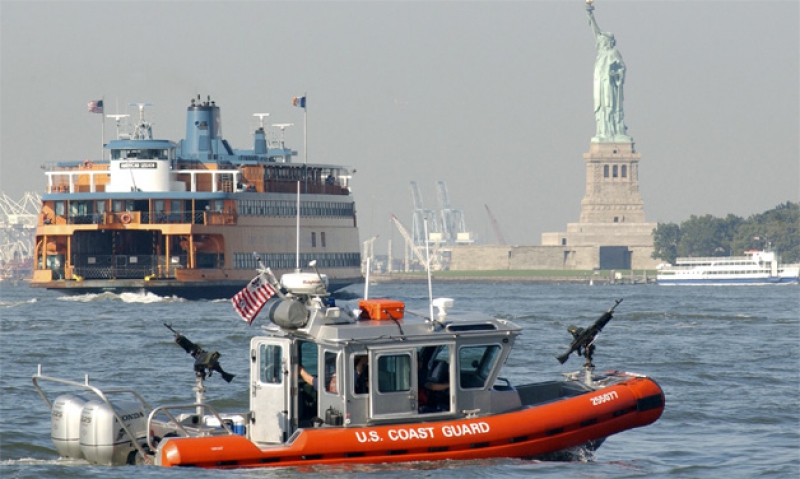
Our country's unsung military branch, the Coast Guard, is fighting the drug war and war on terror, while it guards 95,000 miles of U.S. coastline.
On a typical day, he or she might chase down drug smugglers, or rescue stranded boaters, or cut through Arctic ice floes, or inspect cargo ships, or hunt down pirates, or deliver food to some hellish disaster zone. No, I’m not talking about a superhero; I’m talking about a U.S. Coastguardsman.
There are no “typical days” for the Coast Guard. America’s unsung military branch has become a master of multitasking. Right now, for example, USCG is on the frontlines of America’s two longest wars—the drug war and the war on terror—even as it continues to guard 95,000 miles of U.S. coastline, secure harbors and ports, and respond to oil spills.
Defending America
Like every military branch, USCG has seen nonstop action since 9/11.
It began on 9/11 itself. As the Coast Guard details in an operations recap, USCG “assisted in evacuating more than half-a-million people by water from lower Manhattan” and then pivoted to “the largest homeland-defense and port-security operation since World War II”—a mission that continues to this day.
In 2012, for instance, USCG conducted 25,500 container inspections at U.S. ports and 1,424 boardings of vessels designated as “greater-than-normal risk to the United States.” Coast Guard Commandant Adm. Robert Papp notes that USCG’s International Port Inspection team “has visited some 150 countries to ensure their ports have implemented anti-terrorism measures.”
When the United States shifted the battlefront overseas, the Coast Guard followed: One of the most unlikely contingents among the multinational, multi-service army of armies in Afghanistan included a USCG detachment at the U.S. base in Bagram.
USCG also played a major part in Operation Iraqi Freedom. At the height of the war in Iraq, USCG deployed an armada of cutters, patrol boats and tenders, four Port Security Units, hundreds of personnel and the National Strike Force—an elite group of Coastguardsmen trained to respond to oil spills and other hazardous-substance releases. USCG units defended Iraqi coastal waters, trained Iraqi sailors, provided disaster-incident response, protected oil terminals and provided security at a key Kuwaiti naval base. USCG Cutter Dallas even seized fugitives fleeing Iraq off the coast of Syria. Coastguardsman Nathan Bruckenthal was killed during a seaborne intercept near Basra; he was awarded the Bronze Star for his bravery.
Responding to Disasters and Intercepting Drugs
Of course, not all of USCG’s post-9/11 deployments have been related to the wars of 9/11.
Coast Guard vessels and counter-narcotics teams are deployed throughout the Gulf of Mexico, the Caribbean and Central America to stanch the flow of drugs into the United States. In 2012 alone, USCG vessels interdicted 107 metric tons of cocaine. “Since Fiscal Year 1997,” USCG boasts, “the Coast Guard has seized 806,469 pounds of cocaine and 333,285 pounds of marijuana.”
Like any other war, the drug war produces casualties. Last December, Coastguardsman Terrell Horne III was killed when drug-runners off the coast of southern California rammed his boat.
That’s only a part of the Coast Guard’s role in the Americas. In 2010, USCG units deployed to Haiti after the massive 7.0 earthquake. USCG assessed port infrastructure, coordinated water-vessel movement, and assisted NGOs in supplying refugee camps with humanitarian aid.
That same year, USCG was pressed into action after the Deepwater Horizon oil spill. Hundreds of Coastguardsmen set up shoreline staging areas, carried out controlled burns, surface-skimmed oil slicks and conducted offshore cleanup. Then-Coast Guard Commandant Adm. Thad Allen led the multi-agency response to the disaster.
Allen also led the Coast Guard’s response to Hurricane Katrina in 2005. USCG rescued some 33,500 people from the killer storm. Time magazine aptly labeled Allen “Hero of the Gulf.”
A year earlier, after the 2004 tsunami, USCG assets operating under U.S. Pacific Command’s Joint Task Force 536 delivered more than 80 tons of relief supplies to affected areas in the Indian Ocean.
Projecting Power
In 2007, the Navy, Marine Corps and Coast Guard agreed on a “unified maritime strategy” committing America’s three maritime forces to the full spectrum of sea-power operations.
That explains why we might find a USCG cutter delivering humanitarian aid to the Republic of Georgia; or why USCG cutters are participating in maritime policing and training operations off the western coast of Africa, and in counter-piracy operations as part of Task Force 151 off the eastern coast of Africa; or why USCG cutters and personnel were forward-deployed in 2012 assisting in efforts to protect Iraq’s maritime oil infrastructure and train Iraq’s naval forces; or why 280 Coastguardsmen are based in Bahrain.
Breaking the Ice
Closer to home, USCG is working closely with NORTHCOM to defend U.S. sovereignty in the Arctic. “There’s a whole new ocean opening up that we have responsibilities for,” observes Papp, who is increasingly concerned about America’s Arctic capabilities.
“While our Navy can go under the ice with submarines—and, when the Arctic weather permits, which is not all that often, we can fly over the ice—our nation has very limited Arctic surface capabilities. But surface capabilities are what we need to conduct missions like search and rescue, environmental response, and to provide a consistent and visible sovereign presence.”
Heavy-duty polar icebreakers provide the best Arctic surface capabilities. But the United States has only two operational polar icebreakers—one of which is a medium-duty vessel tasked largely to scientific missions and the other of which has exceeded its 30-year lifespan. Russia, by contrast, deploys more than 20 heavy-duty icebreakers.
The Coast Guard’s motto is Semper Paratus: “Always Ready.” But if policymakers don’t give USCG the tools it needs to protect America’s swath of the Arctic, tomorrow’s Coastguardsmen may not be able to live up to that motto.
- Landing Zone

